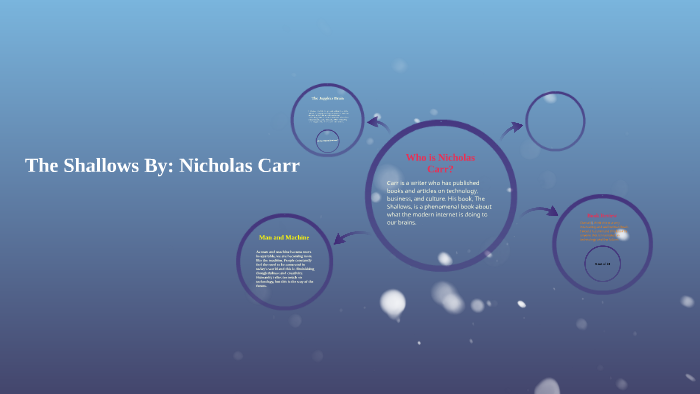

His books have been translated into more than 20 languages. Nick is also the author of two other influential books, The Big Switch: Rewiring the World, from Edison to Google (2008) and Does IT Matter? (2004).

His most recent book, The Shallows: What the Internet Is Doing to Our Brains, is a 2011 Pulitzer Prize nominee and a New York Times bestseller. Nicholas Carr writes about technology, culture, and economics. SpaceNext50 Britannica presents SpaceNext50, From the race to the Moon to space stewardship, we explore a wide range of subjects that feed our curiosity about space!.

Learn about the major environmental problems facing our planet and what can be done about them! Saving Earth Britannica Presents Earth’s To-Do List for the 21st Century.100 Women Britannica celebrates the centennial of the Nineteenth Amendment, highlighting suffragists and history-making politicians.COVID-19 Portal While this global health crisis continues to evolve, it can be useful to look to past pandemics to better understand how to respond today.Student Portal Britannica is the ultimate student resource for key school subjects like history, government, literature, and more.This Time in History In these videos, find out what happened this month (or any month!) in history.#WTFact Videos In #WTFact Britannica shares some of the most bizarre facts we can find.
 Demystified Videos In Demystified, Britannica has all the answers to your burning questions. Britannica Classics Check out these retro videos from Encyclopedia Britannica’s archives. Britannica Explains In these videos, Britannica explains a variety of topics and answers frequently asked questions. As Carr writes: “Google wants information to be free because, as the cost of information falls, we all spend more time looking at computer screens and the company’s profits go up.” It makes sense, then, that Google’s overarching goal is to digitize every conceivable sort of information, transfer it to the web, catalogue it in their search engine, and dispense it to users in small, easily-digested bits with ads in tow. YouTube, for example, is not profitable in itself, but Google bought the company because it enabled them to gather more user information. The more time users spend using Google’s free information services and staring at computer screens, the more money Google rakes in from ad revenue. This is also why Google provides services like email. Everything you do on the Internet is, for Google, a complement. This is because, Carr explains, Google’s model for revenue is based around complements, or in business terms, two things that are consumed together. Carr pauses to reinforce that Google’s seemingly ever-changing business model is in fact very simple: The more time we spend on the internet, the more money Google makes.
Demystified Videos In Demystified, Britannica has all the answers to your burning questions. Britannica Classics Check out these retro videos from Encyclopedia Britannica’s archives. Britannica Explains In these videos, Britannica explains a variety of topics and answers frequently asked questions. As Carr writes: “Google wants information to be free because, as the cost of information falls, we all spend more time looking at computer screens and the company’s profits go up.” It makes sense, then, that Google’s overarching goal is to digitize every conceivable sort of information, transfer it to the web, catalogue it in their search engine, and dispense it to users in small, easily-digested bits with ads in tow. YouTube, for example, is not profitable in itself, but Google bought the company because it enabled them to gather more user information. The more time users spend using Google’s free information services and staring at computer screens, the more money Google rakes in from ad revenue. This is also why Google provides services like email. Everything you do on the Internet is, for Google, a complement. This is because, Carr explains, Google’s model for revenue is based around complements, or in business terms, two things that are consumed together. Carr pauses to reinforce that Google’s seemingly ever-changing business model is in fact very simple: The more time we spend on the internet, the more money Google makes.








 0 kommentar(er)
0 kommentar(er)
